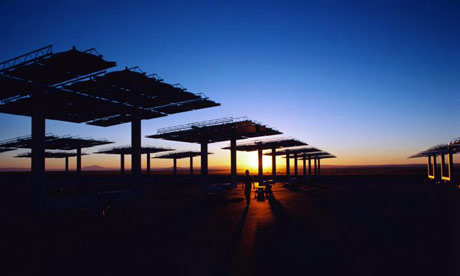Cornwall's reputation for sun, sand and surf could soon be challenged by silicon if a proposed £40m network of solar farms gets the go ahead.
Next week, public consultation will begin for a 15-acre "energy farm" on a green-field site at St Kew, three miles east of Wadebridge, the market town which acts as the gateway to north Cornwall's popular tourist heartlands. A local farmer has raised £4.5m of private investment to construct the first of what could be 10 similar sites across Cornwall and the Isles of Scilly, which, if all built, would triple the UK's current solar generating capacity.
But such investment doesn't automatically guarantee a hi-tech approach: the solar panels will be tilted towards the sun each day by hand and a roaming gaggle of geese will be used to keep the surrounding grass at a manageable length.
A consortium of local companies calling itself "Silicon Vineyards" says the proposed 2MW facility at Benbole Farm – which would be the first utility-scale solar farm in the UK - would generate enough electricity to power 600 homes. It will also grow biomass crops and house an anaerobic digester as an alternative source of power generation. The consortium, which includes the commercial arm of the University of Exeter and a Penzance-based renewables specialist called Renewable Energy Cooperative (R-ECO), says construction could begin in October if planning is approved. The solar farm could start generating electricity commercially by April 2011.
The new coalition government has pledged to "seek to increase the target for renewable energy subject to the advice of the Climate Change Committee". In 2008, 2.25% of energy was produced from renewable sources in the UK, according the Department of Energy and Climate Change. The previous government had set a target of producing 15% of energy from renewables by 2020.
The Benhole Farm business plan estimates that by utilising the recently introduced feed-in tariff which pays generators on this scale 29.3p/kWh, the farm have an annual turnover of £700,000 within seven years. By year 25, the business plan says the farm will have generated a total revenue of £13m. The consortium says it is now speaking to the National Union of Farmers in the hope it will urge its members to consider this technology as a lucrative source of income.
Solar farms are increasingly popular in dry and sunny regions in the US and southern Spain, but the consortium is confident that rain-blessed Cornwall is the logical next frontier for solar technology. "The panels will still be generating, albeit reduced, when there is cloud cover," said Abraham Cambridge, R-ECO's technical and commercial manager. "The optimum months will be May, June, September and October, which are Cornwall's best months for sun."
To reduce costs, R-ECO says it is cheaper to employ five staff to manually adjust the panels so they face towards the sun as it moves across the sky than install automated tilting mechanisms.
If all 10 farms get the go-ahead, the scheme is expected to create 300 jobs. All the components, such as the steel cradles, would be made in Cornwall. Only the silicon PV cells themselves would be sourced from outside the county, in this case Taiwan.
Cornwall has been at the vanguard of the renewable energy industry in the UK since the country's first wind farm was built in the early 1990s. This summer, a £42m electrical "socket" will be laid on the seabed 10 miles off St Ives in anticipation of the installation of four wave energy machines. Earlier this month, Cornwall council signalled its intention to build its own £15m "solar park" on council-owned land next to Newquay airport.
The Silicon Vineyards consortium is confident its proposed solar farms will face far less public resistance than compared to wind turbine applications. "The visual interference will be negligible. It's very low to the ground and the surface of the panels are matt rather than reflective. No planning concerns have been raised by the local planning authority after initial inspections," said Cambridge.
But the solar farm at Benbole Farm could still face some local resistance. Richard Gooden, vice-chair of St Kew Parish Council, said parishioners were only informed of the proposal last week. "I can see there being some objections as the proposed site is adjacent to an area of outstanding beauty. You've got to be careful you don't destroy the one thing that brings people to Cornwall – its natural beauty." The Campaign to Protect Rural England, which has opposed the construction of many wind farms, says it "awaits to see the plans with interest", but adds it would prefer that "car parks and factory roofs" were considered first when siting these sorts of projects.
From the guardian

No comments:
Post a Comment